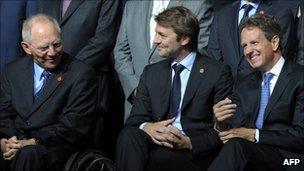EU summit 'will be decisive' on eurozone crisis
- Published
- comments
Christine Lagarde: "If anything the situation is more likely to have worsened than to have improved over the last three weeks"
A European Union summit later this month will agree "decisive" measures to tackle the eurozone debt crisis, the French finance minister has said.
The summit would give "clear answers", said Francois Baroin at the end of talks between ministers from the G20 group of nations in Paris.
He said central banks "would continue to supply banks with liquidity".
The G20 statement also said ministers were "committed that the IMF must have adequate resources".
The G20 meeting came amid continuing fears about the EU's debt-related problems spreading.
The US has expressed particular concern about the threat to its economy.
US President Barack Obama and German Chancellor Angela Merkel spoke by phone on Friday to discuss the crisis.
The head of the International Monetary Fund (IMF) Christine Lagarde said emerging economies - whose growth helped support the world economy during the global crisis - are starting to be affected by weaknesses in the advanced economies.
"The main thing is that the situation has got worse rather than having improved over the last three weeks," she said.
"We heard a lot from the emerging markets that they are very concerned about the risk of contagion," Mrs Lagarde said.
'Contagion'
Details of the rescue plan discussed in Paris include a bigger write-down than previously expected of Greek debt, a much more powerful European bailout fund and a re-capitalisation of weaker banks to arm them against inevitable losses.
The plan needs to be finalised by next weekend's EU summit in Brussels.

US Treasury Secretary Timothy Geithner (R) wants details from his German and French counterparts.
The BBC's Gavin Hewitt says all eyes now turn to whether the leaders of France and Germany will provide the summit with convincing detail.
"They clearly have more work to do, on both the strategy and the details," US Treasury Secretary Timothy Geithner said.
The G20 ministers said they welcomed the measures "to increase the capacity and the flexibility of the EFSF [European Financial Stability Facility]".
The statement added: "We look forward to further work to maximise the impact of the EFSF in order to avoid contagion, and to the outcome of the European Council on October 23 to decisively address the current challenges through a comprehensive plan."
The EFSF has been used to fund bailout packages for Ireland and Portugal but there have been fears it will not be able to cope if it is needed to rescue larger economies such as Spain and Italy, both of which have had their credit ratings downgraded in recent weeks.
Another area under discussion in Paris has been whether to strengthen the IMF.
Developing countries want to boost it, but the US in particular has been reluctant, wanting instead for the eurozone to take stronger action.
Athens is now likely to get its next loan instalment - totalling 8bn euros ($11bn; £7bn) - in November after inspectors from the EU, International Monetary Fund (IMF) and European Central Bank said they had reached agreement with the Greek government on further austerity measures in the country.
The representatives from the so-called troika had been in Athens to check on whether the Greek government was carrying out sufficient spending cuts and tax raising measures.